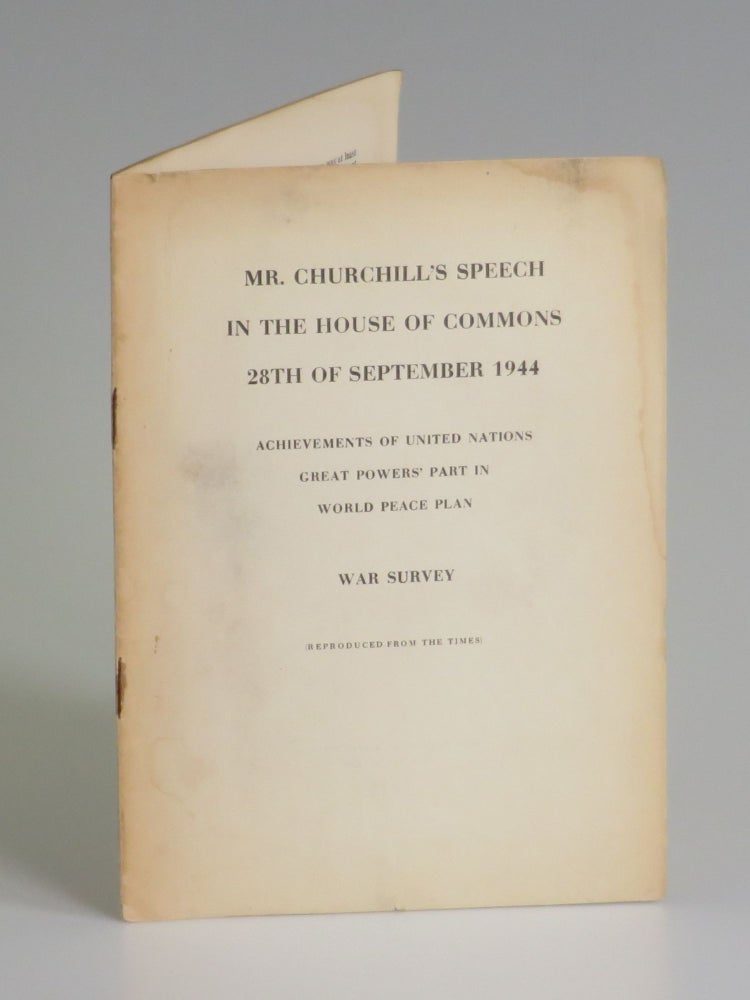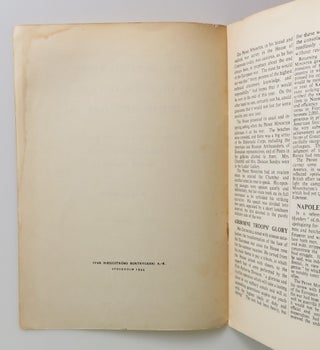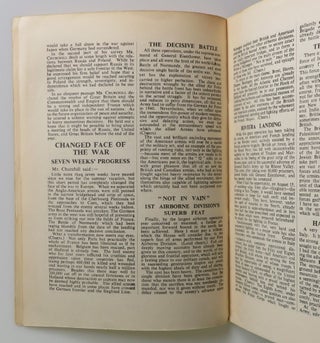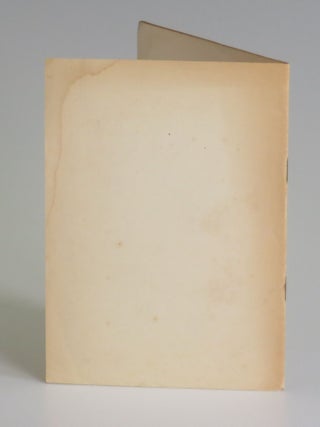Mr. Churchill's Speech in the House of Commons, 28th of September 1944
Stockholm, Sweden: Ivar Haeggstroms Boktryckeri A.B., 1944. First Swedish (English-language) edition, only printing. Pamphlet. This scarce wartime pamphlet is the only printing of the Swedish (English-language) edition of Prime Minister Winston Churchill’s 28 September 1944 speech to the House of Commons regarding the war effort. Bound in wire-stitched paper wraps, the pamphlet measures 8.25 by 6 inches (21 x 15.2 cm). The contents are printed on 15 pages featuring dense type in two columns of up to 60 lines per column, liberally interspersed with subject headings in larger, bold font and preceded by a three-paragraph description of the speech and setting in the House of Commons. Churchill’s Bibliographer records only two stand-alone editions of this speech – this Swedish edition and the Berne British Legation edition – with no publication precedence assigned to either.
Condition approaches very good. Both binding staples are firmly intact, only lightly corroded, and the paper wraps are complete, with no loss or tears. The wraps show trivial wear to extremities, overall toning and soiling, and a faint moisture stain affecting the upper fore edges of the covers. The contents are bright and clean with no previous ownership marks or spotting.
Churchill’s 28 September 1944 speech was lengthy, broad in scope, and reflected the fact that the politics and compromises of alliance were in many ways as fraught, complex, and consequential as military exigencies. Churchill had returned only two days before from the Quebec Conference with Roosevelt. On 27 September he worked on his speech on the war situation, which he gave in the House of Commons on 28 September, “first talking for an hour on the military situation and then, after a break for luncheon, for a further hour on foreign affairs.” (Gilbert, VII, p.975)
In anticipation of Churchill’s speech, “The benches were crowded, and there was a big array of the Diplomatic Corps, including the American and Russian Ambassadors, of Dominion representatives, and of Peers… his opening passages were spoken quietly and deliberately, but his voice took on its full resonance as he unfolded his striking narrative.” As the close of the war in Europe drew closer, it was clear that the task of managing alliances was a strain, and that the eventual victors were already attentive to the historical record and their disparate post war ambitions, heralding the long Cold War yet to come.
Churchill took pains to cultivate his prickly Russian allies – whom he and Roosevelt wanted to open a military front against Japan - sending a supportive and reassuring telegram to Stalin on the 27th and in his speech on the 28th telling the House of Commons “we must never forget… the measureless services which Russia has rendered to the common cause, through long years of suffering, by tearing out the life of the German military monster… holding and beating far larger hostile forces than those which face the Allies in the West…”
He sought to placate his own people as well, contesting what he called a “widespread mis-conception…” in American newspapers “…that the British campaign of 1944 in Burma had been a failure… that nothing much had been done…” Reconciling Polish relations with Russia was yet another challenge. In the second half of his speech, he warned against “intemperate language” and “violent words” in complicating the quest for harmonizing Polish and Russian relations and territorial aspirations. “We recognize our special responsibilities towards Poland” Churchill said, but reminded the House “We must never lose sight of our prime and overwhelming duty – namely, to bring about the speediest possible destruction of the Nazi power.”
Churchill was “anxious to go to Russia as soon as possible” and “On the day after his House of Commons speech, he telegraphed to Roosevelt that he had ‘two great objects’ in mind in going to see Stalin, ‘first to clinch his coming in against Japan and, secondly to try to effect an amicable settlement with Poland’.” (Gilbert, VII, p.978)
Reference: Cohen A196.2. Item #006739
Price: $250.00




